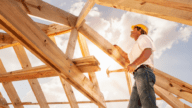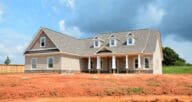The Cost to Build a House in Massachusetts
- Published on
- 14 min read
-
 Sandy John, Contributing AuthorClose
Sandy John, Contributing AuthorClose Sandy John Contributing Author
Sandy John Contributing AuthorSandy John is a freelance writer and editor who specializes in real estate, homeownership, and personal finance articles. Previously the real estate editor for The Atlanta-Journal Constitution, her byline has appeared in several national and regional publications. Sandy has purchased homes in four cities and she has lost track of how many DIY home-improvement projects she’s done.
-
 Joseph Gordon, EditorClose
Joseph Gordon, EditorClose Joseph Gordon Editor
Joseph Gordon EditorJoseph Gordon is an Editor with HomeLight. He has several years of experience reporting on the commercial real estate and insurance industries.
Massachusetts’ strong economy, varied landscapes from beach to mountains, rich history, and solid educational institutions make it a sought-after destination.
Although the state is known for its historic architecture, Massachusetts buyers are increasingly opting for new home construction — either in up-and-coming developments or by purchasing property and hiring a contractor.
In a state with relatively high land prices, how does the total cost to build a house in Massachusetts shake out?
Buyers often choose new construction to minimize competition from others in the market who typically go for an existing home.
“That way, you’re not bidding with other people,” says WayLynn Garcia, an agent in Springfield, Massachusetts, who has completed more sales than the average Springfield agent by 29%.
Building a new home in popular metropolitan areas like Boston typically costs between $160 and $290 per square foot. According to another report, constructing a 2,100-square-foot home averages around $402,709.
The cost to build a house in Massachusetts, broken down
No matter which state you’re in, the steps involved in building a house will vary depending on whether you’re buying a tract home — which is when a builder has bought a large tract of land to divide into lots and build out several homes — or you’re building a custom home.
Remember that the price ranges we’re providing are general estimates. Your agent and your builder can give you more accurate pricing information.
Here is an at-a-glance look at the average costs of each phase of the building, but we will break it all down next:
| Building Phase | Average Cost Nationwide (2025) |
| Foundation | $9,444 |
| Framing | $4,538 |
| Roof | $9,511 |
| Siding | $11,519 |
| Appliances | $250 to $1,300 |
| HVAC System | $10,000 |
| Plumbing System | $4,080 |
| Electrical System | $1,565 |
| Building Permits | $1,000 to $3,0000 |
| Finishes and Fixtures | $30,181 to $321,021 |
Buying a plot of land ($15,000 to $700,000 per acre)
Land prices in Massachusetts vary a lot depending on the region, from $15,000 to $700,000 per acre. In the Western Berkshires, residential land is still affordable, typically between $15,000 and $30,000. But over in Eastern Boston, prices start around $250,000 and can climb higher, thanks to its status as a financial and educational hub.
Foundation ($4,039 to $14,848)
Foundation costs will vary depending on whether you’re pouring a slab or digging a basement, but a typical price range is between $4,039 and $14,848.
Almost all homes in Massachusetts are built with basements. A one-story ranch, a popular style in the state, requires a larger basement than a two-story house, and the more extensive basement means the contractor has to pour more concrete, Garcia notes.
Framing ($1,408 to $7,670)
Framing is when the sticks go up, and a structure starts to take shape. Expect to pay between $1,408 and $7,670 for this phase of building a house in Massachusetts. Framing costs tend to vary due to both the size of the home and the complexity of its design. A one-story home with 2,000 square feet of living space will generally be less expensive to frame than a two-story home with duplicate square footage.
Roof ($5,866 to $13,208)
Roofing doesn’t come cheap, whether it’s on a new house or replacing an existing one. The cost of a new roof typically ranges from $5,866 and $13,208.
The most common roofing material in Massachusetts is asphalt shingles. According to Manta, the average price of a new shingle roof in Springfield is 7,554, generally ranging from $6,614 to $8,495. Again, the style of the home will affect the cost because a one-story home has a larger roof than a house with duplicate square footage on two floors.
Asphalt roof shingles are sold in “squares.” Materials and labor for installation cost $4 to $12 per square foot.
Siding ($5,560 to $17,621)
Siding is another significant variable: Are we talking vinyl, wood, brick, concrete, stone, stucco, or something else entirely?
Siding costs range between $5,560 and $17,621, with vinyl siding typically costing $3,000 to $30,000. New homes in Massachusetts typically have vinyl siding, Garcia said.
Appliances ($250 to $1,300)
Appliance pricing also varies widely. Depending on brand, functionality, finish, and so on, you’ll spend an average of $250 to $1,300 if the home does not come with any. Costs can go up to $5,000 if you choose high-end appliances.
HVAC system ($5,000 to $15,000)
The installation of a new heating and cooling system could cost $5,000 to $15,000, depending on the size of your home, the type of system being installed, and the complexity of the process.
Plumbing system ($2,280 to $5,120)
On average, plumbing costs between $2,280 and $5,120. For a 2,000-square-foot home, expect to pay $4.50 per square foot for rough-in plumbing.
Electrical system ($602 to $2,594)
The cost to wire a house is, on average, between $602 and $2,594. The exact cost depends on your home’s size and the type of electrical wiring being installed.
Building permits (variable)
Permits vary by state, city, and county, but they typically range from $500 to $2,000. By law, all new construction and renovations in Massachusetts must have a building permit. In addition to the building permit, the home may also need permits for plumbing, electrical, and other systems.
In Boston, for example, the building permit cost is $50, plus $10 for every $1,000 of the estimated work cost. So, for a $300,000 home, the building permit would be $3,050. The plumbing permit costs $20 plus $5 for every plumbing fixture in the home. The electrical permit cost is based on how much power the home’s system is designed to handle, so bigger systems cost more.
Finishes and fixtures (variable)
Finishes and fixtures comprise everything from countertops to sinks and lighting to flooring. Pricing varies widely and depends heavily on your preferences.
Average carpet installation costs can start at several hundred dollars and go up to $2,812, while hardwood flooring installation starts at around $2,469 and can go up to $7,033. Laminate countertops range from $841 to $1,732, while granite averages from $2,000 to $6,000.
Building a custom home vs. home in development
As a general rule, building a custom home that is tailored to your every need will be more expensive than buying a tract home from a builder.
According to Garcia, building a custom home in Massachusetts will cost $350 or more per square foot, while building a tract home in Massachusetts will cost $280 per square foot.
Building a custom home will also require you to assemble a team of experts to design and build the home from start to finish. Here are the team members you will need and a breakdown of what they might cost you:
Architect (5% to 20% of the final build cost)
Hiring an architect will be integral to making your vision come to life when building your custom dream home. Before you search for the right architect, be clear about what you are looking for. Make sure to do your research and ask your network for recommendations for architects in your area who have experience designing the kind of home you are looking to build.
The cost of hiring an architect could make up anywhere between 5% and 20% of the final cost of the build. For a 2,000-square-foot home in Massachusetts, with a final build cost of $700,000, that would amount to $35,000 to $140,000. Some architects will charge by the hour or per square foot of the build for their services, but this is less common.
General Contractor (10% to 20% of the final build cost)
A general contractor will oversee the entire process of building your custom home. They will be responsible for hiring and paying subcontractors, vendors, and construction workers.
General contractors typically charge a cost plus fee arrangement, which accounts for the cost of the labor and materials plus a negotiated fee for the general contractor. This usually comes out to 10% to 20% of the final cost of the build.
Costs of building a custom house in Massachusetts
As we mentioned, building a custom home usually comes with additional costs. Again, your agent can help you determine more accurate costs. Below are average figures to give you an idea.
Land survey ($376 to $768)
Land surveys, which identify your property lines and land features, range between $376 and $768.
Excavation and grading ($20,000 to $100,000 per acre)
If you’re buying a tract home, the land price will be rolled into the overall price to build a home. If you’re buying a lot on your own and building a custom home, you’ll have to pay to clear the land, run utilities, and put in a driveway. The price can vary widely, depending on the size and features of the lot and how far it is from town.
The cost to clear a lot ranges from $1,400 to $5,800, with another $400 to $6,500 for grading and leveling.
In rural Massachusetts, where sewer hookups aren’t available, you’ll have to install a septic tank and a well. One of Garcia’s clients recently got an estimated $25,000 for a septic system alone.
Common home styles in Massachusetts and their average costs
The two most common styles of homes built in Massachusetts are ranch style and colonials, according to Garcia.
Ranch homes typically have an open concept area that includes the kitchen, dining area, and family room. Bedrooms are usually on both sides of the home, with an open area in the middle. The colonial floor plan isn’t as open, and the bedrooms are usually on the second floor.
Here are the typical prices for these styles:
| Home style | Average cost (all-in) |
| Ranch | $150,000 to $600,000 |
| Colonial | $400,000 to $2,100,000 |
More affordable options for building a home in Massachusetts
While going with a bare-bones building strategy can get you into a new construction home for less, cheaper isn’t always better. Shoddy build quality will inevitably lead to problems down the road. Anything from a leaky roof to poor sound insulation can be a frustrating discovery when you’ve only been in your new home for a few months. Plus, there’s value in creating a home you genuinely want, not just one you’re settling for.
Alternative home-building options can give you more for your money and offer valuable flexibility during the construction process.
Tiny homes
A tiny house is usually 600 square feet or less. They’re not ideal for large families, but building a tiny house can be faster and more affordable than a conventional home if a smaller space fits your lifestyle. On average, tiny homes cost between $30,000 and $60,000 to build.
They can also be a great option as starter houses, especially since the construction of new starter homes in Massachusetts has declined since 1980.
Modular and prefabricated homes
Modular and prefab homes are allowed in any area in Massachusetts that is zoned for housing, says Fred Kozyra, owner of Kozyra Construction, a Brimfield, Massachusetts, company specializing in custom modular homes.
Modular houses are built to the same standards as site-built houses, he explains, adding that buyers shouldn’t confuse a modular home with a mobile home or manufactured home, which is built to a different standard. Mobile homes must be placed in mobile home parks in most areas of the state, Kozyra shares.
As with a site-built home, the per-square-foot price of a modular house will depend on the features and finishes you select, Kozyra says.
Is the cost of building a house in Massachusetts cheaper than buying?
Typically, buying an older home is cheaper than building one—but not in Massachusetts. It’s one of the few states where building a new home can actually be more cost-effective than purchasing an existing one.
Depending on the neighborhood, buying an existing Massachusetts home will cost around $605,000. Meanwhile, building a home will likely cost an average of $402,709.
Choosing the new construction route comes with some long-term savings you can enjoy as a homeowner:
- Energy-efficient features: Newly constructed homes are generally more energy-efficient than older homes. According to the U.S. Energy Information Administration, homes built after 2000 use 21% less energy than older homes on average. This is partially due to stricter energy regulations and better insulation and windows in new homes.
- New home warranties: New construction homes are often covered under builder warranties for a specified period. When purchasing an older home, most key systems, such as the HVAC, roof, and plumbing, will be older and no longer covered under any kind of warranty.
- Fewer maintenance costs in the first few years: With a newer home, you can count on your HVAC, plumbing, electrical system, and more to function correctly with little required maintenance in your first few years of homeownership. Older homes will likely have older roofs and systems, requiring you to pay for replacement much sooner.
- Cheaper insurance costs: Many homeowners insurance providers offer discounts for new construction homes, due to the lessened risk of damages common in aging homes.
Get started on building your dream home
If you’ve decided to build a new home rather than purchasing an existing home in Massachusetts, you should have a top agent on your side. An experienced real estate agent can help you find a building lot, whether you want to build a tract home or a custom home.
Your agent can also help you find and work with a contractor to build your new home. You want to find both an agent and a contractor you feel comfortable with — and who keep open lines of communication.
If you decide to build a house, you should be prepared to wait. Building a home from scratch takes at least six months, and possibly up to a year, Garcia warns. If the foundation isn’t started before freezing weather arrives in Massachusetts, the builder may have to wait until spring to start the house.
Building a home also requires you to make many decisions about the home’s design, layout, and finishes. Do your research early and be prepared to make your final decisions when the builder needs them because waffling and changing your mind will only increase the costs of building your home and the time required to get the items needed to bring your vision to life.
Header Image Source: (Simona Stefanova / Unsplash)
- "How Much Does A Foundation Or Basement Cost?," HomeAdvisor (November 2024)
- "How Much Does It Cost To Frame A House In 2025?," HomeAdvisor (August 2024)
- "How Much Does It Cost To Replace A Roof In 2025?," HomeAdvisor (December 2024)
- "How Much Does It Cost To Wire A House?," HomeAdvisor (November 2024)
- "How Much Does A Building Permit Cost?," HomeAdvisor (January 2024)
- "How Much Does An Asphalt Shingle Roof Cost?," HomeAdvisor (September 2024)







